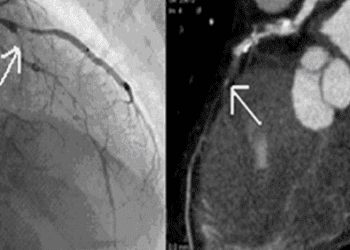Aldosterone antagonist therapy linked to reduced mortality following STEMI without heart failure
1. In this meta-analysis of available randomized clinical trials, use of aldosterone antagonist therapy in patients with preserved ejection fraction following ST-elevation myocardial infarction (STEMI) was associated with reduction in overall mortality.
2. Use of aldosterone agonist was linked to a small increase in serum potassium and no overall difference in serum creatinine levels.
Evidence Rating Level: 1 (Excellent)
Study Rundown: Aldosterone antagonists (AAs) following primary acute management of STEMI has been demonstrated to reduce ventricular remodeling following ischemic insult and improve mortality in patients with reduced ejection fraction. The utility of AA therapy in patients with preserved ejection fraction has not been definitively demonstrated, though a number of trials have attempted to look at the role of AA therapy following myocardial infarction (MI). The current study is a meta-analysis of available randomized clinical trials (RCTs) that evaluated the role of AA therapy following STEMI in patients with preserved ejection fraction. The study found that AA use was linked to an overall improved mortality but similar rates of heart failure, recurrent MI, and arrhythmia compared to placebo. There was also a small increase in potassium level but no significant reduction in creatinine clearance.
The main strength of the study is the inclusion of high-quality trials with a large number of combined patients. The lack of patient specific data, and variation in primary MI management, type of AA therapy, and use of other agents may lead to bias in the results.
Click to read the study in JAMA Internal Medicine
Relevant Reading: Mineralocorticoid receptor antagonists in patients with acute myocardial infarction — A systematic review and meta-analysis of randomized trials
In-Depth [ systematic review and meta-analysis]: This study included RCTs which evaluated the effects of AAs for patients over the age of 18 with STEMI and either no heart failure, or measured ejection fraction >40%. Studies were excluded if they did not report the outcomes under investigation for this study, or if patients had ejection fractions less than 40%. The main outcomes were mortality, new heart failure, recurrent MI, ventricular arrhythmia, changes in serum potassium, and creatinine level.
A total of 10 trials were included encompassing 4147 patients and the following AAs: spironolactone, eplerenone, and canrenoate. Use of AA was linked with lower mortality (2.4%vs 3.9%; odds ratio [OR], 0.62; 95%CI, 0.42-0.91; p = 0.01), but no difference in new heart failure (OR 0.82; 95%CI, 0.56-1.20; p = 0.31), recurrent MI (OR 1.03; 95%CI, 0.57-1.86; p = 0.91), or ventricular arrhythmia (OR 0.76; 95%CI, 0.45-1.31; p = 0.33). There was an observed increase in serum potassium of 0.07 mEq/l (p = 0.02), but no change in serum creatinine (p = 0.13).
Image: PD
©2018 2 Minute Medicine, Inc. All rights reserved. No works may be reproduced without expressed written consent from 2 Minute Medicine, Inc. Inquire about licensing here. No article should be construed as medical advice and is not intended as such by the authors or by 2 Minute Medicine, Inc.







